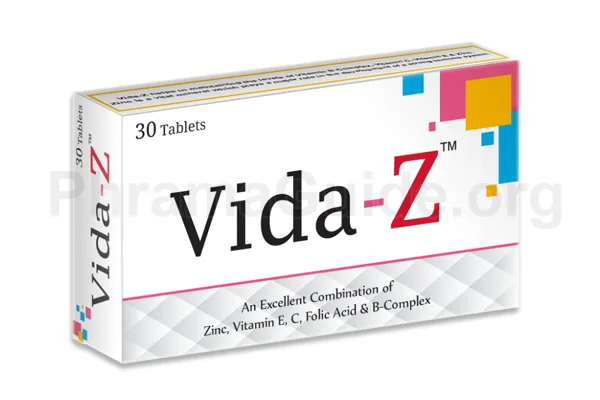Vida Z is a supplement with an excellent combination of vitamins and minerals. It provides essential nutrients that play essential roles in the proper functioning of the body.
Vida Z Tablet Use for:
- Overall Health Maintenance
- Prevention of Vitamin and Mineral Deficiencies
- Supporting Immune Function
- Bone Health
- Energy Production
- Antioxidant Protection
- Healthy Skin, Hair, and Nails
- Reducing the Risk of Chronic Diseases

What is Vida Z?
Vida Z is one of the leading brands with a combination of Vitamins and Minerals, manufactured and marketed by High-Q International (Pvt) Ltd, Pakistan.
Vida Z Alternatives : Other Similar Brands
The following are Some Alternative Brands of Vida Z and Their Manufacturers.
- Surbex Z : Abbott Laboratories, Pakistan.
- Vitrum : Searle Pakistan (Pvt) Ltd.
- Quantum Gold : Martindale Health Care.
- Hicap-M : Himount Pharmaceuticals.
- Mazivit M : Mass Pharma (Pvt) Ltd.
- Supradyn-N : Byer Schering Pharma (Pvt) Ltd.
- Visionace : Acti-Med Pharma (Pvt) Ltd.
- Pregnovit : Himount Pharmaceuticals.
- Neurovit-M : Unipharma (Pvt) Ltd.
- Dynamin-V : Stanpharma (Pvt) Ltd.
- Vivioptal : AGP (Pvt) Ltd.
- Multibionta-M : Merck (Pvt) Ltd.
Ingredients of Vida Z Tablet
Presently, Vida Z is available in Tablet Form
Each Vida Z Tablet Contains:
- Vitamin B1: 15mg
- Vitamin B2: 15mg
- Vitamin B3: 100mg
- Vitamin B5: 20mg
- Vitamin B6: 20mg
- Vitamin B12: 12mcg
- Vitamin C: 500mg
- Vitamin E: 30IU
- Folic Acid: 150mcg
- Zinc Sulphate: 22.5mg
Who Should Not Use Vida Z?
Vida Z is generally considered safe for most individuals when taken in appropriate doses, there are some contraindications and precautions to be aware of. The following contraindications are associated with the ingredients of Vida Z
- Vitamin C:
- Kidney stones: High doses of vitamin C may increase the risk of kidney stone formation in individuals with a history of kidney stones or those with impaired kidney function.
- Iron overload: Vitamin C enhances iron absorption, which may be problematic for individuals with iron overload disorders like hemochromatosis.
- Vitamin E:
- Anticoagulant therapy: High doses of vitamin E may increase the risk of bleeding in individuals taking anticoagulant or antiplatelet medications.
- Underlying medical conditions: Vitamin E supplements should be used with caution in individuals with certain conditions such as cardiovascular disease, diabetes, or bleeding disorders.
- B Complex Vitamins:
- Allergy or hypersensitivity: Some individuals may be allergic or hypersensitive to specific B vitamins or other components present in B complex supplements.
- Underlying medical conditions: Precautions may be necessary for individuals with certain medical conditions, such as kidney disease or liver disease.
- Folic Acid:
- B12 deficiency: High folic acid intake can mask vitamin B12 deficiency, which is more common in older adults. If folic acid is taken without addressing an underlying B12 deficiency, it may lead to neurological complications.
- Zinc:
- Copper deficiency: Prolonged and high-dose zinc supplementation may lead to copper deficiency. Copper is an essential mineral, and a balance between zinc and copper intake should be maintained.
- Immune system disorders: Zinc supplements should be used with caution in individuals with certain immune system disorders, such as rheumatoid arthritis or systemic lupus erythematosus.
What is the Recommended Daily Dosage of Vida Z?
Vida Z Dose for Adults:
- One Tablet daily with or after a meal.
How Vida Z Works?
Vida Z’s mode of action depends on its active ingredients:
- Vitamin C (Ascorbic Acid):
- Antioxidant: Vitamin C acts as a potent antioxidant, neutralizing harmful free radicals in the body and protecting cells from oxidative damage.
- Collagen synthesis: Vitamin C plays a crucial role in the synthesis of collagen, a protein that provides structure to connective tissues, such as skin, bones, and blood vessels.
- Immune function: Vitamin C supports the immune system by stimulating the production and function of white blood cells, which help fight off infections.
- Vitamin E (Tocopherol):
- Antioxidant: Vitamin E acts as a powerful antioxidant, protecting cells from damage caused by free radicals and oxidative stress.
- Cell membrane protection: It helps stabilize and protect cell membranes from oxidative damage.
- Anti-inflammatory effects: Vitamin E exhibits anti-inflammatory properties, which may contribute to its protective effects on various tissues and organs.
- B Complex Vitamins:
- Energy production: B vitamins, such as thiamin (B1), riboflavin (B2), niacin (B3), pantothenic acid (B5), pyridoxine (B6), and cobalamin (B12), play key roles as coenzymes in energy metabolism, helping convert carbohydrates, fats, and proteins into usable energy.
- Nervous system support: B vitamins are essential for the proper functioning of the nervous system, including the synthesis of neurotransmitters, nerve cell maintenance, and myelin sheath formation.
- DNA synthesis and cell division: B vitamins, particularly folate (B9) and cobalamin (B12), are critical for DNA synthesis, cell division, and the formation of new cells.
- Folic Acid (Folate):
- DNA synthesis and repair: Folic acid is necessary for DNA synthesis, repair, and methylation processes in the body.
- Red blood cell production: It plays a crucial role in the production of red blood cells, aiding in the formation and maturation of healthy red blood cells.
- Neural tube development: Folic acid is crucial during early pregnancy as it supports proper neural tube formation in the developing fetus.
- Zinc:
- Enzyme function: Zinc acts as a cofactor for numerous enzymes involved in various biochemical reactions in the body, contributing to their proper functioning.
- Immune function: Zinc plays a role in supporting immune function, including the development and activity of immune cells.
- Gene expression: Zinc is involved in gene expression and transcription, regulating the activity of certain genes.
- Antioxidant defense: It helps maintain the body’s antioxidant defense system, protecting against oxidative stress and supporting overall cell health.

Leave A Comment